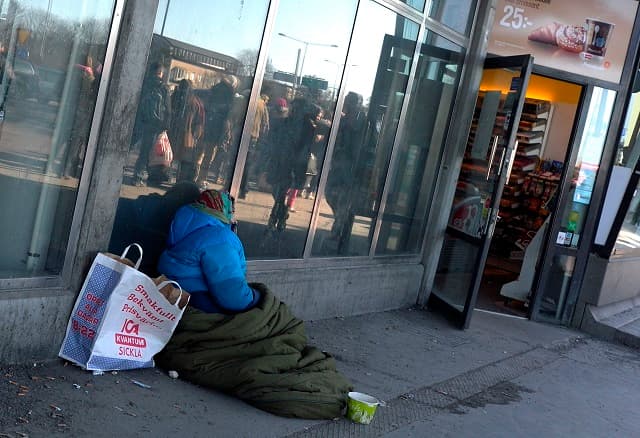Amnesty International: Sweden lets down vulnerable EU migrants

Sweden fails to respect the human rights of vulnerable EU migrants, claims Amnesty International in a new report which says many people in that category lack shelter, water, and subsidized healthcare in Sweden.
Human rights organization Amnesty carried out in depth interviews with 58 EU citizens in Sweden, most of them Roma, in order to examine whether Sweden is fulfilling its responsibility to safeguard human rights.
In the report, "A cold welcome. Human rights of Roma and other 'vulnerable EU citizens' at risk", the organization says that there were shortcomings in both the Swedish government and municipal and regional councils when it comes to respecting EU migrants' rights.
"We see that there is a large gap between the reality these people are living in, waking up under a bridge when it's 2C, and the framework and policies which do exist," said Anna Lindenfors from Amnesty Sweden.
She said that the Swedish government and authorities say these people are in Sweden temporarily -- particularly over the summer -- but that this doesn't match up with Amnesty's findings. Many of the people interviewed had been in Sweden for two years or more.
One 28-year-old woman interviewed by Amnesty slept in a car outside a Malmö shopping mall. She used the mall's toilet, which was subject to a fee and closed at 9pm, and had no access to tap water so had to buy bottled water.
Some areas of Sweden have met the needs of vulnerable migrants successfully, according to the report, which highlights the eastern island of Gotland as a positive example. On Gotland, Amnesty noted that long-term hostels helped people to establish themselves in Sweden and improve their chances of getting a job.
"Everyone we spoke to here came here to find work to be able to care for themselves and their children. They don't come here to live under a bridge," said Lindenfors.
Swedish authorities estimate that around 4,700 people classed as vulnerable EU migrants live in Sweden. The majority are Roma people from Romania and Bulgaria and those who spoke to Amnesty all came from Romania.
In many cases they provide for themselves and their families through temporary or occasional work or by begging and collecting recyclable cans and bottles to return for a deposit.
All the interviewees who had experience of begging said that it had got harder to make money this way over the past few years, and that in 2017/2018 they rarely made over 100 kronor in a day.
Comments
See Also
Human rights organization Amnesty carried out in depth interviews with 58 EU citizens in Sweden, most of them Roma, in order to examine whether Sweden is fulfilling its responsibility to safeguard human rights.
In the report, "A cold welcome. Human rights of Roma and other 'vulnerable EU citizens' at risk", the organization says that there were shortcomings in both the Swedish government and municipal and regional councils when it comes to respecting EU migrants' rights.
"We see that there is a large gap between the reality these people are living in, waking up under a bridge when it's 2C, and the framework and policies which do exist," said Anna Lindenfors from Amnesty Sweden.
She said that the Swedish government and authorities say these people are in Sweden temporarily -- particularly over the summer -- but that this doesn't match up with Amnesty's findings. Many of the people interviewed had been in Sweden for two years or more.
One 28-year-old woman interviewed by Amnesty slept in a car outside a Malmö shopping mall. She used the mall's toilet, which was subject to a fee and closed at 9pm, and had no access to tap water so had to buy bottled water.
Some areas of Sweden have met the needs of vulnerable migrants successfully, according to the report, which highlights the eastern island of Gotland as a positive example. On Gotland, Amnesty noted that long-term hostels helped people to establish themselves in Sweden and improve their chances of getting a job.
"Everyone we spoke to here came here to find work to be able to care for themselves and their children. They don't come here to live under a bridge," said Lindenfors.
Swedish authorities estimate that around 4,700 people classed as vulnerable EU migrants live in Sweden. The majority are Roma people from Romania and Bulgaria and those who spoke to Amnesty all came from Romania.
In many cases they provide for themselves and their families through temporary or occasional work or by begging and collecting recyclable cans and bottles to return for a deposit.
All the interviewees who had experience of begging said that it had got harder to make money this way over the past few years, and that in 2017/2018 they rarely made over 100 kronor in a day.
Join the conversation in our comments section below. Share your own views and experience and if you have a question or suggestion for our journalists then email us at [email protected].
Please keep comments civil, constructive and on topic – and make sure to read our terms of use before getting involved.
Please log in here to leave a comment.